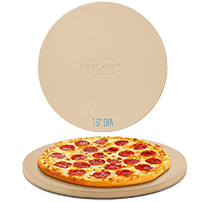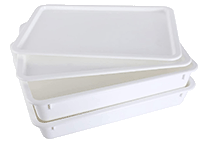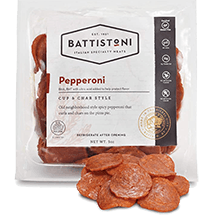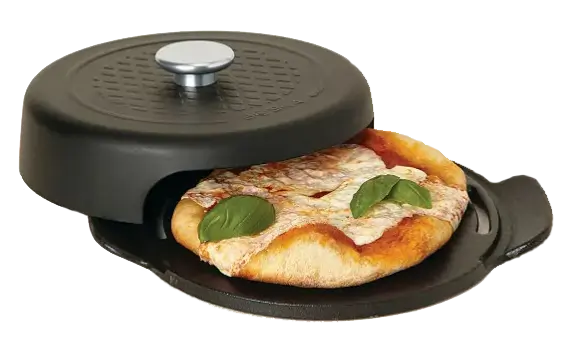If you are serious about making quality homemade pizza, then you need a pizza stone. It’s a great investment and will take your pizza making skills to a new level.
Pizza stones are affordable and if properly seasoned and cared for, they can last a lifetime. It’s easy to season a pizza stone to make it last for all of the family pizza nights to come.

What is a Pizza Stone?
A pizza stone or sometimes called a baking stone, is a surface that retains heat and helps cook food evenly. Pizza stones are a way to recreate the heat of a wood-fired or brick oven at home, making an excellent homemade pizza that bakes quickly.
Pizza stones are made from ceramic, cordierite, or a composite material that retains heat and can get hotter than most home ovens.
If you regularly use a pizza stone, you may have wondered if you need to season it. Depending on who you ask, you will get different answers. But first, let’s take a look at what it means to season a pan.
What Does Seasoning Mean?
Seasoning a pan is a way to trap fat and oils to cure the pan and create a nonstick layer. The process naturally happens over time. Each time the pan is used, it will leave a residue.
But since this takes time, many home chefs choose to intentionally season the pan by adding layers of oil and heating the pan to season it for the next use. If you are a cast-iron aficionado, then you are probably already familiar with seasoning a cast-iron skillet.
Seasoning a pizza stone is not as straightforward as seasoning a cast-iron skillet. Research online is kind of confusing as there are conflicting reports of whether or not you should season a pizza stone. The answer is a definite maybe: it depends on the type of pizza stone you have in your kitchen.
When You Shouldn’t Season a Pizza Stone
Before you consider whether you should season a pizza stone, you will want to read the instructions from the manufacturer. Some pizza stones are glazed or sealed, creating a nonstick surface so the stone does not need seasoning.
It is already nonstick. Pizza stones made by companies like California Pizza Stones and PizzaCraft have specific instructions to never season them.
If you are using a cast iron baking pan for pizzas, then it’s fine to season it. If you are unsure if your pizza stone is glazed, check the manufacturer. If they state that it’s non-absorbent, it means it’s fully glazed.
If you don’t know the brand of your pizza stone because it was a gift or a thrift store find, then you can usually judge by the color and state of the stone.
Before using a used pizza stone, clean it with a mix of one part baking soda to one part water. When it’s clean, you should be able to tell if it would benefit from seasoning or not.
When Should You Season a Pizza Stone
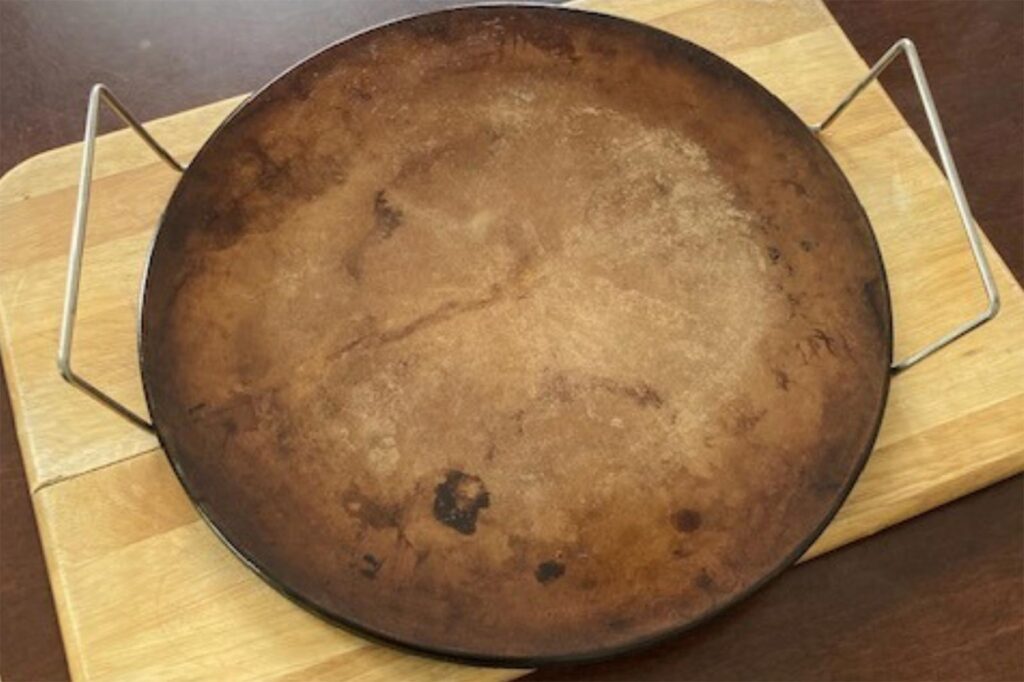
If your pizza stone is new and there are no specific instructions not to season your pizza stone, and it isn’t sealed or glazed in some way, then it’s fine to season your stone.
Some of the benefits of seasoning a pizza stone are:
- It will keep the heat better than an unseasoned stone.
- It’s easier to bake with, and the dough won’t stick.
- Seasoning protects the stone from cracking.
- Seasoning adds flavor. Using a seasoned stone adds a depth of smokiness to the crust.
- It extends the life of the pizza stone.
- Seasoned stones are easier to clean.
Natural Seasonings
Every time you use your pizza stone, it will naturally season as the oil and cheese cook. Of course, this takes time and patience. But it encourages you to make more homemade pizza.
So if you are looking for a reason to eat homemade pizza several times a week, you can always claim it’s to season your pizza stone. But if you don’t want to wait, you can be proactive and season your stone with oil.
How to Season a Pizza Stone With Oil
Start with a clean and dry pizza stone. With a paper towel, spread some oil on the stone. It doesn’t matter what type of oil you use. Coconut, olive, avocado, vegetable, or canola, whichever you use, is fine.
We tend to stick with olive oil since it’s the oil we use when making pizza. We think that a strong-smelling oil like coconut will leave a weird after smell. While we enjoy pizzas with unusual toppings, coconut pizza doesn’t sound appealing, so we stick with a more neutral oil.
Once the stone is completely covered in oil, place the stone in a cold oven. Turn on the oven to 450° F and bake for 30 minutes. The oil will be baked into the stone, creating a nonstick layer. After 30 minutes, turn off the oven and let it cool down with the stone inside.
Remove the stone when it has cooled. While the stone is cooking the oil, it creates a lot of smoke, so it’s best to do it on a day you can have a window or two open or at least turn on a fan.
You can repeat this process as often as you like. The goal of seasonings is to make a nonstick layer. It’s normal for the stone will darken over time. So a well-used pizza stone will have a dark, discolored appearance.
Pro Tips
- Never wash your pizza stone with soap.
- Always air dry your pizza stone.
- Avoid submerging your pizza stone in water. They don’t need to soak.
- Always read the care instructions on your pizza stone. Some brands advise that you shouldn’t season a pizza stone.
- Never put a pizza stone in the dishwasher.
- Don’t cut your pizza on a pizza stone. Invest in a large cutting board instead.
Do you use a pizza stone? How do you care for yours?

